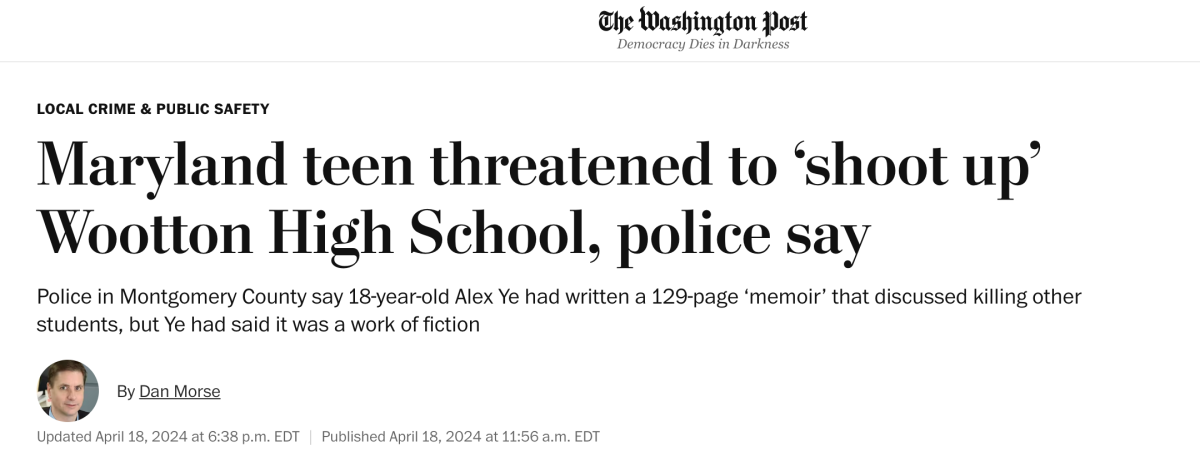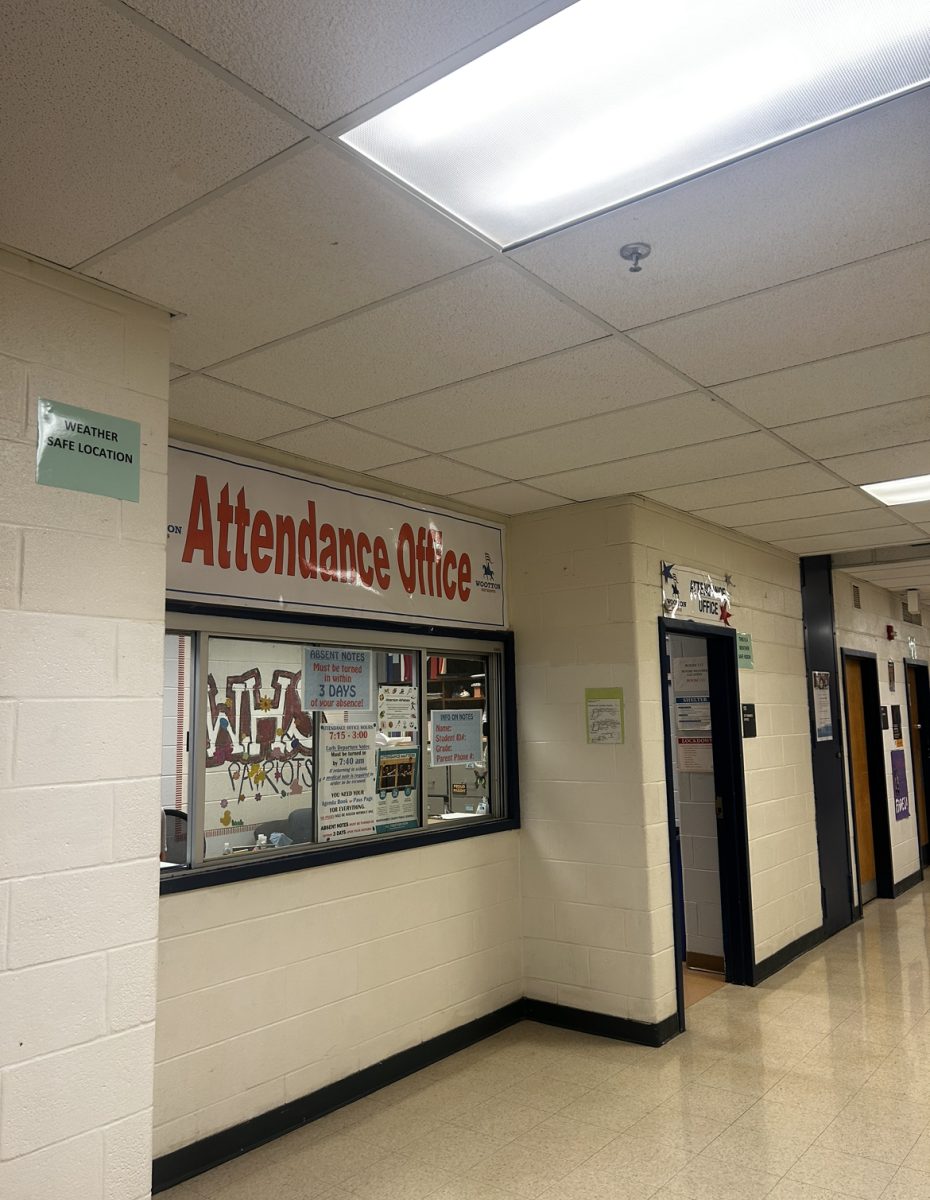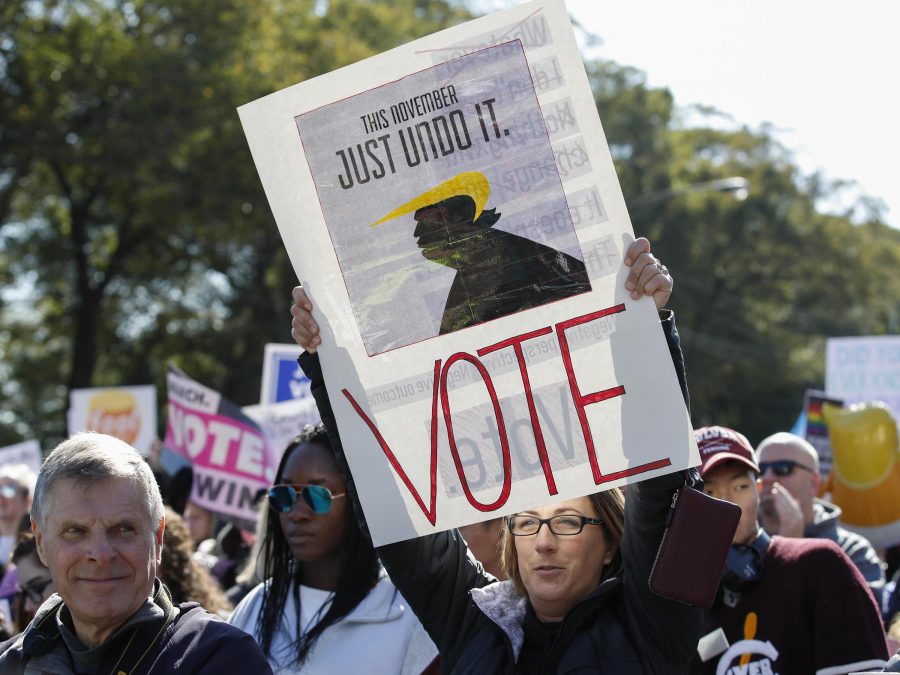This year’s midterm elections drew attention from all corners of the nation: Would the GOP keep their unified government? Would the Democratic party capture either of the Houses in the Legislature?
The predicted “blue wave” of midterms did not come turn as many seats as expected, only capturing the House with 234 to 199, while the GOP kept the Senate 52 seats to 45. In the state governor elections, Republicans kept their advantage, 27 seats to 23. “A lot of people, especially millennials and teens, were talking about voting for the Democratic party and contributing to the blue wave, but I think most of them didn’t vote,” sophomore Meena Zoks said. “I know millennials and teens tend to vote Democratically, which is why I think the wave wasn’t as big since seniors had the highest turn out and tend to vote Republican in general.”
Youth voter turnout increased dramatically for midterm elections.
The Center for Information and Research on Civic Learning and Engagement estimates that the youth voter turnout increased by 10 percent since the last midterm election to reach roughly 31 percent. As a whole, 49.3 percent of all eligible voters turned out to vote this year, and according to Vox is the “highest midterm voter percentage since 1914.”
Despite the increase in younger voters, the United States Census Bureau finds that historically, the voter turnout percentage for teens compared to other age groups is the lowest. In the 2014 midterm elections, only 16 percent of registered voters ages 18-29 voted, while 55 percent of registered voters ages 60 and older had voted. This trend is not an anomaly, as younger voters have been turning out with rates around 17 percent lower than the next lowest voting age group ever since 1986.
Democrat Ben Cardin wins senate by a landslide.
In the Maryland midterm elections, Ballotpedia reports that Democratic incumbent Ben Cardin won the Senate race against Republican candidate Tony Campbell. Cardin won 63.9 percent of the votes, Campbell won 31.3 percent and Independent candidate Neal Simon and Libertarian candidate Arvin Vohra received 4.8 percent of the votes collectively.
Third parties nearly always receive the least amount of votes in every election. “We have a two-party system so it’s harder for third parties to get votes. Also, because people already don’t believe that third parties will win, it sets those groups up for failure because when people see how little votes [the party] gets, they won’t vote for them next election and it becomes an endless cycle,” sophomore Peyton Eppard said. “I’m not surprised that Ben Cardin won, since he’s the candidate of one of the two main parties and also because incumbents have an advantage in elections such as funding and everyone already knows who they are.”
All seven of the seats in the House of Representatives for Maryland have not changed, which means that the same six Democratic incumbents and one Republican incumbent will be representing their district for the next two years. Montgomery County is split between three congressional districts: the third district represented by Democrat John Sarbanes, sixth district represented by Democrat David Trone and eighth district represented by Democrat Jamie Raskin. “David Trone is the representative for our district,” junior Abby Toney said. “My parents voted for the Democratic candidate for the House of Representatives because they share the same views.”
Maryland incumbent Larry Hogan keeps position as governor.
Republican incumbent Larry Hogan has kept the Maryland governor seat for the second time, winning by 13.4 percent over his Democratic counterpart Ben Jealous. “I don’t really like Larry Hogan,” sophomore Josh Mariani said. “I don’t agree with some of his policies and his appearance frightens me.”
Sophomore Daniel Hwang disagrees. “I think that reelecting Larry Hogan is beneficial to Maryland because he supports students through acts such as extending our summer break,” Hwang said.
Although Hogan is a Republican in a mainly Democratic area, Marylanders still like him anyway. According to The Washington Post, 65 percent of Maryland citizens approve of the way that Hogan is handling the economy while 22 percent disapprove, 55 percent approve of the way he is handling taxes while 32 percent disapprove, 51 percent approve of transportation management while 34 percent disapprove and 43 percent approve of education policies while 40 percent disapprove.
Record number of women elected into the legislature.
The midterm elections were also a historic mark for women and minorities of many different states. According to CNN, a record number of women have been elected into the legislature; 35 new women and 65 incumbents were voted in, beating the last all-time high of 85 women. “It’s a really great advancement for women in the government,” Zoks said.
Midterms have pushed many states to elect female representatives for the first time. Republican Marsha Blackburn defeated former Democratic Gov. Phil Bredesen to become Tennessee’s first woman senator. Maine also voted in their first female governor, Democrat Janet Mills, who formerly worked as Maine’s attorney general. Connecticut and Massachusetts have also elected their first African American congresswomen, Jahana Hayes and Ayanna Pressley.
Native American and Muslim candidates elected for first time.
Diversity was one of the biggest results of these elections. Native Americans and Muslims candidates were elected for the first time. Democrat Jared Polis of Colorado also became the first openly gay man to win a governor’s race in the United States. Polis won 52 percent of the votes, while Republican Walker Stapleton won 44 percent. Libertarian Scott Helker won three percent of the votes and Bill Hammons of the Colorado Unity Party won one percent.
Toney thinks that diversity plays an important role in the government. “I feel like America is embracing more ethnicities, and women are starting to be more assertive and becoming a bigger part of politics because they aren’t afraid,” Toney said. “It’s really important that we have a government that can truly represent who the people are.”
Closest election in Texas history.
The Texas Senate race between Republican incumbent Ted Cruz and Democratic candidate Robert “Beto” O’Rourke was one of the most closely watched elections throughout the nation. Cruz, who ran for president during the 2016 presidential elections, won by 2.6 percent, a little less than 200,000 votes out of the over eight million Texans who decided to vote. Libertarian candidate Neal Dikeman won .8 percent of the votes, which translates to a little more than 65,000 votes. The election between Cruz and O’Rourke made history, as this was the first close election in Texas, a predominantly red state.
Sophomore Shannon Snape believes that even though O’Rourke did not win the election, he still succeeded in something else. “I think that Beto still succeeded because he was still so close to winning in a historically super red state,” Snape said. “I think that this means that Democratic spirit is spreading through the nation, and in my opinion it will mean that people are thinking safer about topics such as gun control and equal rights.”
Sophomore Janani Ilangovan has her own opinions on the midterm elections. “I think it’s better that we have a divided government now even though the legislative process will slow down,” Ilangovan said. “I know that the majority of Americans dislike when the government is controlled by one party.”
There will be investigations into President Trump and Russian ties.
What will happen now that the Democrats have taken the House?
According to The New York Times, there most likely will be investigations into President Trump and Russian ties and maybe even impeachment proceedings. Legislatively speaking, next to nothing will happen due to the return of a divided government, which leads to gridlock: something that the Democrats would consider a significant upgrade from the beginning of Trump’s presidency.
What would have happened if the Republicans had kept the House?
New York Times writer Matt Flegenheimer writes that politically, there would be a more “one-party” rule in Washington, or perhaps an even more emboldened President Trump, with almost certainly no impeachment. Legislatively speaking, there would be more deregulation and maybe more tax cuts. There could also be another try at repealing the Affordable Care Act, or Obamacare, which was passed during the Obama administration in 2010.
Social media has also played a large role this election. The use of mainstream platforms such as Twitter, Facebook, Instagram and Snapchat is not new, but candidates are using these to broadcast their views now more than ever. Not only are using these platforms much cheaper than producing a traditional one-minute TV advertisement, but they also help reach young voters, a growing demographic, easier than any other option.
Celebrities give support to candidates.
Candidates were not the only group to spread ideas through politics. Celebrity Beyoncé posted images of her wearing “Beto” emblazoned clothes to show support for the Democratic candidate for the senate in Texas on Nov. 6. Taylor Swift, another renowned artist, announced on Instagram that she and her mother had voted early for the Democratic candidate for the Senate Phil Bredesen, who was previously Tennessee’s governor, on Oct. 30. Other big stars such as Nick Jonas, Oprah Winfrey and Arnold Schwarzenegger also advocated for voting.














